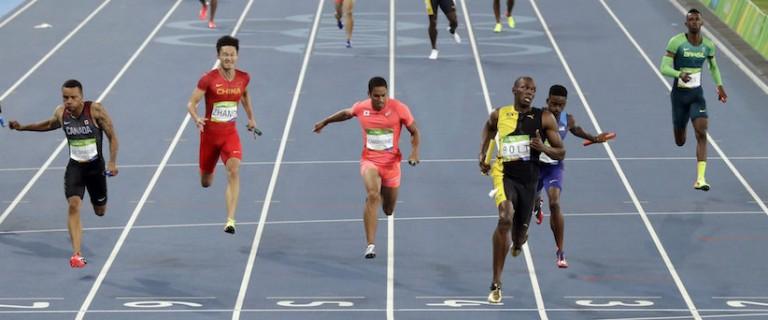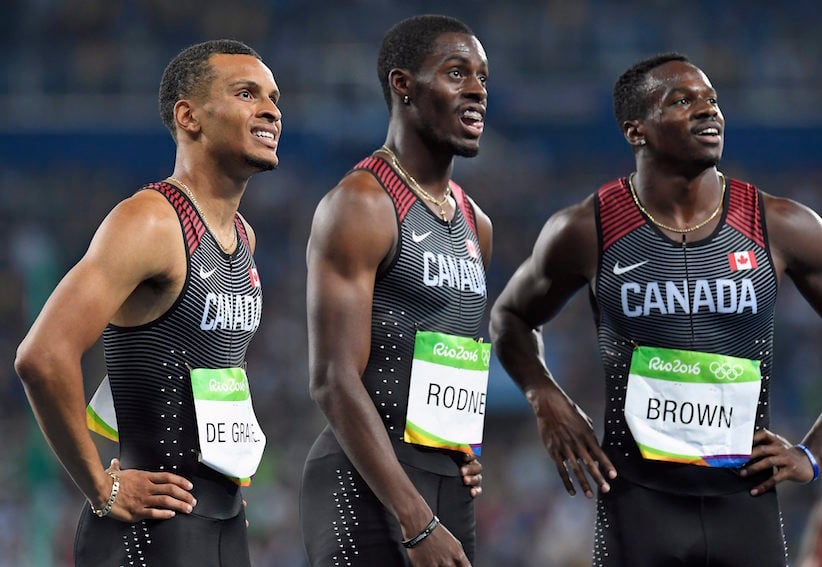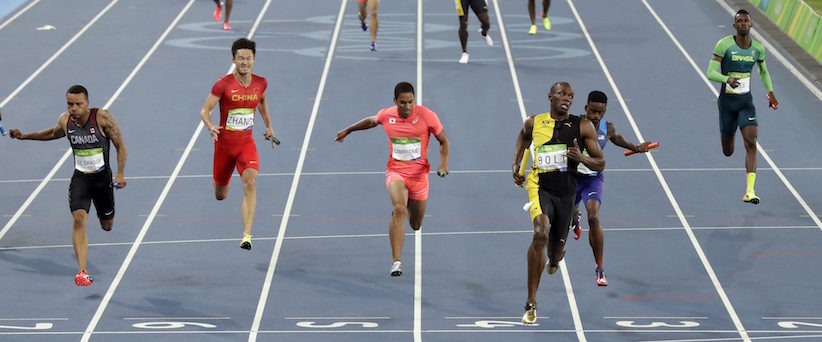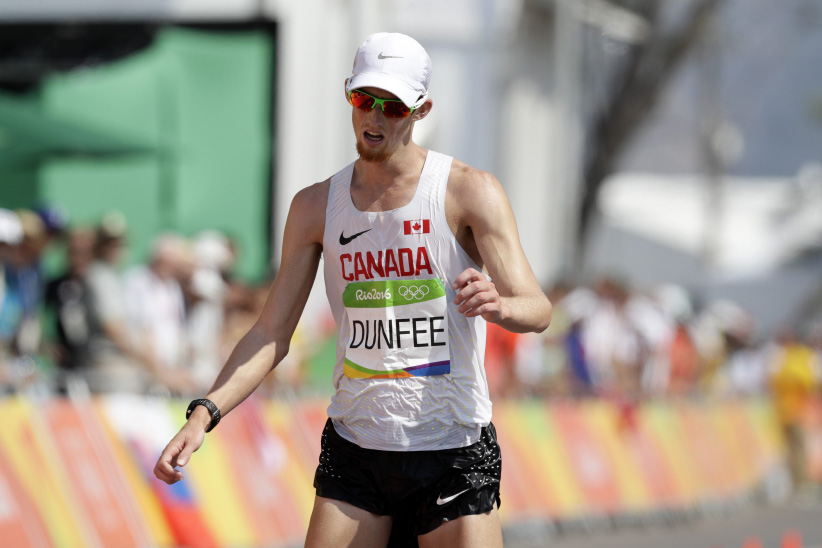DQ turns Canada’s oh-so-close miss into 4 x 100 bronze
Canada’s run is not over yet — Melissa Bishop races Saturday in 800 final

Jamaica’s Usain Bolt, center left, crosses the finish line to win the men’s 4×100-meter relay final during the athletics competitions of the 2016 Summer Olympics at the Olympic stadium in Rio de Janeiro, Brazil, Friday, Aug. 19, 2016. (AP Photo/Martin Meissner)
Share

Sometimes history repeats itself. Four years ago in London, the Canadian men’s 4 x 100-m relay team came third and were out taking their victory lap around the track when the news finally reached them: they had been disqualified for stepping outside their lane. In Rio, Friday night, it was the United States’ turn to see their own third place finish overturned on a violation—an early baton pass—and a bronze come back to Canada, delayed and different.
The medal, Canada’s 21st of the Rio Games, and sixth in track and field, was a sideshow—albeit a happy one. The night, as it so often does, belonged to Jamaica, with Usain Bolt and his teammates completing his sought-after triple-triple. That is, gold in the 100m, 200m and 4 x 100m races for three straight Olympics. Their time of 37.27 was well short of the 36.84 world record they set in London in 2012, but no matter. Bolt was all alone out front coming down the back stretch. Then, he and his teammates celebrated victory by dancing around the stadium to the sounds of Bob Marley’s Jammin’.
“I’ve proven to the world I’m the greatest,” Bolt said afterwards, confirming that the relay was the final race of his unparalleled Olympic career. “I can’t prove anything else.”
Japan finished in the silver slot with a time of 37.60. The Americans were not far behind at 37.62, with Canada trailing by just .02 seconds after a furious anchor sprint by Andre De Grasse. For a few minutes, it seemed that this was the way the 21-year-old Markham, Ont., runner’s first Olympics would end—with a bronze and silver in the 100m and 200m races, and an oh-so-close miss in the team event. Then the replays came in and it was clear that the USA’s Mike Rodgers was still outside the passing area when he handed the baton to Justin Gatlin for the second leg.
The Americans were still celebrating on track, posing for pictures with flags draped around their shoulders for long minutes after the media in the stadium and the fans at home were informed that they no longer had reason to be happy. Television cameras caught the moment when they finally glanced up at the scoreboard and saw the DQ next to their names. Tyson Gay could be seen mouthing, “What the…” They removed the flags and headed off the field.

The Canadian team, meanwhile, were all smiles and backslaps. Akeem Haynes of Calgary, Aaron Brown and Brendon Rodney of Toronto, all aged 24, and De Grasse become the first Canadian relay squad to medal—and keep it—since Robert Esmie, Glenroy Gilbert, Bruny Surin and Donovan Bailey won gold in Atlanta 20 years ago. And their time of 37.64 finally betters a Canadian record that had stood ever since that hot Georgia night.
“We were in the middle of an interview. We were looking at the race on video and talking about how we came fourth with a national record when it turns out we had the bronze. That changed our reaction a lot,” Brown said afterwards. Haynes was asked if they regretted not getting their own chance to celebrate and wave the Canadian flag before the fans in the stadium. “Not really, we were more upset about the fourth-place finish,” he said. “As long as we got the medal, that’s all that matters.”
The United States launched a formal appeal of the decision on the track, and it may still be overturned, but that is increasingly the way the relay race goes. All teams review the video immediately afterwards looking for the slightest reason to object. In such a picky climate, however, the American baton blunder appeared pretty blatant.
“It does hurt,” said a subdued Gatlin, the 100m silver medalist, who ran the second leg and received the early pass. “We worked hard and we wanted to get the job done.”
De Grasse, with his third medal of the Games more or less in hand, said he was cautiously happy about the accomplishment, but wondered what might have been. “I think I needed just one more metre,” he said of the near photo-finish between Japan, the U.S. and Canada behind Bolt. “I don’t know what happened, I think my legs were a little bit fatigued from running the 100 and 200. I probably only had 97 metres or 98 metres in that race. One or two metres could have made up the difference between a fourth-place finish and a silver medal.”

The track bronze capped yet another big day for Canada with bronzes in women’s soccer, and individual equestrian for Eric Lamaze. And for a while it seemed that Canada had won yet another athletics medal, a bronze for Evan Dunfee in the 50-km race walk. The 25-year-old from Richmond B.C., finished in fourth place, just 14 seconds off the podium, in a time of 3:41.28, bettering his own Canadian record by more than two minutes. But after filing a protest over a bodycheck delivered by third-place finisher Hirooki Arai of Japan as they jostled for position less than two kilometres from the finish, Dunfee was upgraded to a medal. A Japanese appeal of the protest flipped the results once again.
“Not many people can understand the pain athletes are in three and a half hours into such a gruelling race. I believe that both the Japanese athlete and myself got tangled up but what broke me was that I let it put me off mentally and once I lost that focus, my legs went to jello,” Dunfee said in a statement released after the decision. “Contact is part of our event, whether written or unwritten, and is quite common, and I don’t believe that this was malicious or done with intent.”
Dunfee declined to take the matter to the Court of Arbitration for Sport, saying his conscience wouldn’t allow him to win a medal that way.
“I will sleep soundly tonight, and for the rest of my life, knowing I made the right decision. I will never allow myself to be defined by the accolades I receive, rather the integrity I carry through life,” he said.
Canada’s track and field run is all the more remarkable because their meet got off to such a lousy start, with 10 of 12 runners on the first day failing to advance past the heats, and Brianne Theisen-Eaton finding herself in sixth place halfway through the heptathlon. “I remember coming back to the village and saying this isn’t what I want,” says Athletics Canada head coach Peter Ericksson. “I was worried. Big time.”

Even though the country had won a record eight medals at the world track and field championships, expectations were modest for Rio—two or three medals, max, says Ericksson. “The mindset has been the whole time that this is about performance, we are selecting you for performance,” he says. But with the caveat that Team Canada anticipated that most of its athletes would make the semi-finals, or finals, not the podium.
Ericksson is overjoyed with six—and perhaps another to come tomorrow with Melissa Bishop racing in the 800-m final. It will surely mean more money for athletics in future, and generate interest at the grassroots. But he doesn’t expect the good times to continue in Tokyo 2020 and beyond. “If we can average around four medals, I think we are doing well as a nation,” he says. “If you look at the size of the country, the population, the popularity of the sports, four is probably what we can do.”
How far above the curve is Canada in Rio? With one full day of athletics competition remaining, the country now has more medals than Great Britain (five) and is tied with China and France. Canada ranks seventh by golds, but fourth overall.
Perhaps the only Canadian with mixed feelings last night was Glenroy Gilbert, part of the record-setting 4 x 100 team in Atlanta, and now the relay team’s coach.
“We won the Olympic Games and set a record. That medal will always be there, the memory will always be there. I’m fine with that,” said Gilbert. “It feels good. It’s been a long journey back here,” he added.
But twenty years gone, it’s a whole new world.
Related video